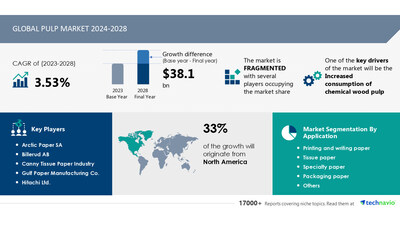Pulp Market to Expand by USD 38.1 Billion (2024-2028), Driven by Rising Chemical Wood Pulp Consumption, AI Impacting Market Trends - Technavio
NEW YORK, Nov. 21, 2024 /PRNewswire/ -- Report on how AI is redefining market landscape - The global pulp market size is estimated to grow by USD 38.1 billion from 2024-2028, according to Technavio. The market is estimated to grow at a CAGR of almost 3.53% during the forecast period. increased consumption of chemical wood pulp is driving market growth, with a trend towards rising use of fluff pulp due to increased absorbency. However, high costs involved in production of pulp poses a challenge.Key market players include Arctic Paper SA, Billerud AB, Canny Tissue Paper Industry, Gulf Paper Manufacturing Co., Hitachi Ltd., International Paper Co., Koch Industries Inc., Mercer International Inc., Metropolic Paper Industries, Metsa Board Oyj, Nath Industries Ltd., Nine Dragons Paper Holdings Ltd., Nippon Paper Industries Co. Ltd., Oji Holdings Corp., Sappi Ltd., Shanying International Holding Co. Ltd., Sinar Mas, Stora Enso Oyj, UPM Kymmene Corp., and WestRock Co..
AI-Powered Market Evolution Insights. Our comprehensive market report ready with the latest trends, growth opportunities, and strategic analysis- View Free Sample Report PDF
Forecast period | 2024-2028 |
Base Year | 2023 |
Historic Data | 2018 - 2022 |
Segment Covered | Application (Printing and writing paper, Tissue paper, Specialty paper, Packaging paper, and Others), Grade Type (Chemical pulp, Mechanical and semi-chemical pulp, and Non-wood pulp), and Geography (North America, APAC, Europe, South America, and Middle East and Africa) |
Region Covered | North America, APAC, Europe, South America, and Middle East and Africa |
Key companies profiled | Arctic Paper SA, Billerud AB, Canny Tissue Paper Industry, Gulf Paper Manufacturing Co., Hitachi Ltd., International Paper Co., Koch Industries Inc., Mercer International Inc., Metropolic Paper Industries, Metsa Board Oyj, Nath Industries Ltd., Nine Dragons Paper Holdings Ltd., Nippon Paper Industries Co. Ltd., Oji Holdings Corp., Sappi Ltd., Shanying International Holding Co. Ltd., Sinar Mas, Stora Enso Oyj, UPM Kymmene Corp., and WestRock Co. |
Key Market Trends Fueling Growth
The pulp market is witnessing significant trends in various industries like food and beverage, personal care, and paper packaging. Eco-friendliness is a major focus with the demand for green packaging increasing. Leading paper producers like International Paper and Stora Enso are investing in renewable energy operations and producing eco-friendly packaging products. The food and beverage industry is shifting towards paper-based packaging solutions due to consumer inclination and anti-plastic sentiments. Paper packaging materials such as white paper, recycled paper, and specialty papers are in high demand. FMCG companies like Unilever are partnering with the Pulpex Consortium to develop laundry detergent solutions using recycled paper pulp. The personal care industry is also embracing green packaging, with an emphasis on recyclability and sustainability. Toilet papers and antimicrobial tissue products are popular choices. The retail sector is also adopting paper packaging for its lightweight and recyclable properties, reducing plastic use and logistics costs. The paper industry is the largest forest-based industry, using wood, bamboo, rice husk, and wheat straw as raw materials. The production line includes chemical pulping and the conversion of paper into various forms such as wrapping paper, writing paper, printing paper, tissue paper, rolls, and specialty papers. The rapid penetration of the internet, smartphones, and online retailing has led to an increase in paper packaging demand for e-commerce. The paper industry is essential for socio-economic development, providing employment opportunities in developing countries. However, it's crucial to address deforestation concerns and focus on sustainable forest management. The water-consuming industries, including paper and pulp, are under pressure to reduce water usage and greenhouse gas emissions. The wrapping paper segment is also gaining popularity, especially during festive seasons. The paper industry is continually innovating to meet the needs of modern consumers while minimizing its environmental impact.
The diaper and hygiene sanitary pad market holds significant importance in the global business landscape. This sector's growth is driven by the increasing awareness of safety and health practices. The primary raw material for these products is fluff pulp, derived from softwood, which enhances absorbency and prevents leaks. With rising birth rates in Latin America and Asia, the diaper industry is projected to expand by around 50% by 2023. Additionally, the convenience of disposable diapers caters to the fast-paced lifestyle of modern consumers. Fluff pulp's long fibers effectively absorb liquids and semi-solids, ensuring user comfort and reliability. This market trend is expected to continue as health and hygiene remain top priorities for consumers worldwide.
Insights on how AI is driving innovation, efficiency, and market growth- Request Sample!
Market Challenges
- The pulp market faces significant challenges in various industries like food and beverage, personal care, and paper packaging. Eco-friendly packaging products are in high demand due to anti-plastic sentiments and consumer inclination towards green packaging. Renewable energy operations and reduced greenhouse gas emissions are essential for forest-based mills like International Paper and Stora Enso. The food and beverage industry requires paper-based packaging solutions for their products, while the personal care industry relies on tissue paper for hygiene products. Recycling infrastructure is crucial for the recycling of paper packaging materials, including white paper, printing paper, and specialty papers. FMCG companies like Unilever are collaborating with the Pulpex Consortium to develop laundry detergent solutions using paper-based packaging instead of plastic. The retail sector's rapid penetration by e-commerce and online shoppers necessitates lightweight and recyclable packaging like corrugated boxes and paper bags. The paper industry's largest competitors, including International Paper and Stora Enso, are investing in mills that use renewable energy and produce recycled paper pulp from wood fibers, bamboo, rice husk, wheat straw, and other sustainable sources. Socio-economic development in developing countries presents opportunities for the paper industry's growth, particularly in the production of paper-based packaging materials for kitchens, toilets, and households. However, challenges like deforestation and the use of chemical pulp remain concerns. The paper industry's sustainability is crucial in addressing plastic packaging waste, particularly in the wrapping paper segment. Leading paper producers are focusing on commercial printing papers, converting papers, digital papers, and office papers to cater to various industries' demands. The paper industry's future lies in its ability to adapt to changing consumer preferences, reduce water consumption, and address the challenges of plastic use and recyclability in various segments, including tissue paper products, newsprint, and packaging.
- The pulp market is characterized by significant investments from existing vendors in technological advancements to boost pulp production. This strategy primarily involves acquiring smaller pulp vendors or assets, leading to increased production capacity but high costs. Integration with established vendors facilitates access to raw materials. The pulp industry's engineering is sophisticated and productive. However, the energy consumption in pulp and paper production is substantial. Capital-intensive machinery requires large amounts of energy and water to process forest materials and extract fibers, as well as to remove water during the papermaking process.
Insights into how AI is reshaping industries and driving growth- Download a Sample Report
Segment Overview
This pulp market report extensively covers market segmentation by
- 1.1 Printing and writing paper
- 1.2 Tissue paper
- 1.3 Specialty paper
- 1.4 Packaging paper
- 1.5 Others
- 2.1 Chemical pulp
- 2.2 Mechanical and semi-chemical pulp
- 2.3 Non-wood pulp
- 3.1 North America
- 3.2 APAC
- 3.3 Europe
- 3.4 South America
- 3.5 Middle East and Africa
1.1 Printing and writing paper- The printing and writing paper market is experiencing growth due to the increased demand for dyes and pigments in developing countries. China, India, and Indonesia are major consumers of printing and writing paper, driven by rising literacy rates and population growth. This segment includes various types of paper used for books, office applications, and personal use. Uncoated freesheet paper is the largest category, accounting for office reprographics, business applications, and envelope paper. Uncoated mechanical paper is an alternative, used for newspaper inserts, paperback books, and directories. Coated freesheet paper, with an added clay or additive coating, is suitable for highly illustrated books, advertising materials, and magazines. Coated mechanical paper, made of mechanical fibers with an added coating, is used for catalogs and coupons. The pulp market will grow as a result of the increased production of these types of printing and writing paper.
Download complimentary Sample Report to gain insights into AI's impact on market dynamics, emerging trends, and future opportunities- including forecast (2024-2028) and historic data (2018 - 2022)
Research Analysis
The pulp market encompasses a vast array of industries, including food and beverage, personal care, and paper packaging. This sector is currently the largest industry globally, with a significant focus on eco-friendly packaging products due to growing anti-plastic sentiments and consumer inclination towards sustainability. Forest-based materials like wood and bamboo, as well as agricultural waste such as rice husk and wheat straw, are increasingly used to produce paper packaging materials. These materials offer a more sustainable alternative to traditional chemical pulp and reduce deforestation. The paper packaging industry includes various products like wrapping paper, writing paper, and more. The personal care industry also relies heavily on pulp for products like kitchen and bathroom paper for households and personal hygiene, contributing significantly to the market's growth. Recycling infrastructure plays a crucial role in the circular economy of pulp and paper products.
Market Research Overview
The pulp market encompasses various industries, including food and beverage, personal care, and paper packaging. With growing anti-plastic sentiments and consumer inclination towards eco-friendly products, the demand for green packaging solutions is surging. Paper packaging materials, such as white paper, recycled paper, and specialty papers, are gaining popularity. Leading paper producers like International Paper and Stora Enso are investing in renewable energy operations to reduce greenhouse gas emissions. Forest-based raw materials, including wood, bamboo, rice husk, and wheat straw, are the primary sources of pulp. The paper industry is the largest consumer of water, making water conservation a critical concern. The rapid penetration of the internet, smartphones, and online retailing has led to an increase in demand for lightweight and recyclable packaging, particularly corrugated boxes and paper bags. The paper packaging market is expected to grow significantly due to its sustainability advantages over plastic packaging waste. FMCG companies are also exploring paper-based packaging solutions for their laundry detergent and toilet paper products. The market for writing and printing papers, newsprint, and converting papers is also expanding. Socio-economic development in developing countries is driving the demand for paper-based packaging solutions. However, concerns over deforestation and the use of chemical pulp remain challenges for the industry. The kitchen and household sectors, including personal hygiene and sanitation, are major consumers of paper products.
Table of Contents:
1 Executive Summary
2 Market Landscape
3 Market Sizing
4 Historic Market Size
5 Five Forces Analysis
6 Market Segmentation
- Application
- Printing And Writing Paper
- Tissue Paper
- Specialty Paper
- Packaging Paper
- Others
- Grade Type
- Chemical Pulp
- Mechanical And Semi-chemical Pulp
- Non-wood Pulp
- Geography
- North America
- APAC
- Europe
- South America
- Middle East And Africa
7 Customer Landscape
8 Geographic Landscape
9 Drivers, Challenges, and Trends
10 Company Landscape
11 Company Analysis
12 Appendix
About Technavio
Technavio is a leading global technology research and advisory company. Their research and analysis focuses on emerging market trends and provides actionable insights to help businesses identify market opportunities and develop effective strategies to optimize their market positions.
With over 500 specialized analysts, Technavio's report library consists of more than 17,000 reports and counting, covering 800 technologies, spanning across 50 countries. Their client base consists of enterprises of all sizes, including more than 100 Fortune 500 companies. This growing client base relies on Technavio's comprehensive coverage, extensive research, and actionable market insights to identify opportunities in existing and potential markets and assess their competitive positions within changing market scenarios.
Contacts
Technavio Research
Jesse Maida
Media & Marketing Executive
US: +1 844 364 1100
UK: +44 203 893 3200
Email: media@technavio.com
Website: www.technavio.com/
![]() View original content to download multimedia:https://www.prnewswire.com/news-releases/pulp-market-to-expand-by-usd-38-1-billion-2024-2028-driven-by-rising-chemical-wood-pulp-consumption-ai-impacting-market-trends---technavio-302311617.html
View original content to download multimedia:https://www.prnewswire.com/news-releases/pulp-market-to-expand-by-usd-38-1-billion-2024-2028-driven-by-rising-chemical-wood-pulp-consumption-ai-impacting-market-trends---technavio-302311617.html
SOURCE Technavio



